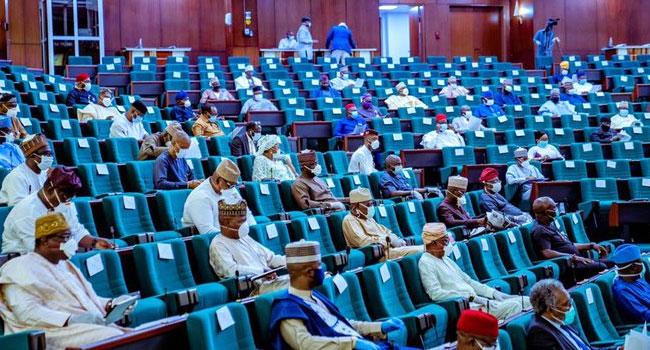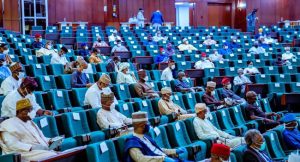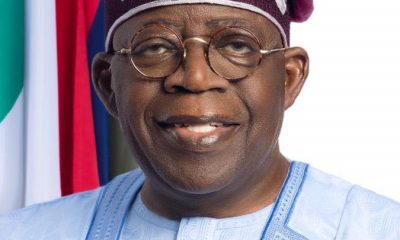Business
Unbelievable As NIMASA Sells 82 Vehicles For N5.8m In 12 Years

Unbelievable As NIMASA Sells 82 Vehicles For N5.8m In 12 Years
NIMASA– Members of the House of Representatives on Friday were shocked to the marrow as the Nigerian Maritime Administration and Safety Agency (NIMASA) publicly justified the sales of 82 vehicles for the sum of N5.8 million over the past 12 years.
Trouble started when the NIMASA Executive Director, Mr. Chudi Offodile, announced during the resumed investigative hearing into the disposal of public property by the Agencies between 2010 and 2022 to unravel the extent of illegal auctioning of public property and non-remittance of revenue realized into the Consolidated Revenue Fund’, chaired by Hon. Julius Ihonbvere, that due process was followed.
The documents presented and obtained by the Nigerian Tribune showed that a Peugeot Expert Ambulance with a market value of N200,000 was sold at a forced liquidation or auction value of N95,000; a Honda Civic Saloon Car with a market value of N170,000 was sold at N76,500; a Toyota Hilux (Grounded) with a market value of N300,000 was sold at N140,000; another Toyota Hilux (Accidental) with a market value of N200,000 was sold at N96,000; and another Toyota Hilux (Grounded) with a market value of N250,000 was sold at N115,000.
In the same vein, two units of Toyota Hilux, which were at the time of inspection in the custody of Carbotage Consultant in Lagos and put at N1 million market value, were sold at N470,000 each for forced liquidation or auction value; a Honda Civic put at N210,000 was sold at N95,000; a Honda City put at N190,000 market value was sold at N80,000, among others.
Through its office in Abuja, a Toyota Hilux put at N500,000 market value was sold at N245,000; a Toyota Avensis put at N300,000 market value was sold at N145,000; a Toyota Corolla put at N300,000 market value was sold at N147,000; and two units of Honda Civic put at N90,000 market value were sold at N30,000 each, among others.
Other lawmakers who spoke during the investigative hearing demanded documentary evidence of funds remitted into the CRF account as provided by extant provisions of the Procurement Act, Proceeds of Crimes Act, and other known legislation or financial regulations.
In his presentation, Mr Offodile, who denied knowledge of the provisions of the Public Procurement Act, 2007 on the remittance of the funds generated from the sale of public assets, however, affirmed that the proceeds of sales were paid by the Auctioneers into NIMASA’s coffers.
When asked whether the Agency has a mechanic’s workshop where faulty vehicles can be repaired, Mr. Offodile answered in the negative.
While expressing surprise that most of the vehicles displayed in the document presented to the Ad-hoc Committee didn’t show that they are old or not in good condition, Hon. Ihonbvere said: “Looking at them (pictures of vehicles captured in the documents), some of them are looking new,” adding that for Nigerians, a 13-year-old Toyota Hilux is not old.”
Hon. Ihonbvere thereafter narrated how a former Edo State Governor engaged a female mechanic to fix some of the vehicles tagged as unserviceable and recovered over 100 vehicles while other spare parts were stored.
He explained that over 100 vehicles fixed by the female mechanic were deployed to various MDAs, thereby blocking financial leakages.
Hon. Ihonbvere specifically expressed concern over the rationale behind the placement of an advertisement on March 29, 2022, calling for a public auction of NIMASA vehicles and the sale of all the vehicles on March 30, 2022, through forced liquidation or auction.
While alleging that the move “leaves us with the impression that it’s a pre-arrangement,” the Majority Leader argued that the process contravened the extant Public Procurement Act to dispose of public assets within 24 hours.
Hon. Ihonbvere, who disclosed that the Ad-hoc Committee is in the custody of petitions against NIMASA alleging that the vehicles were sold to some officials and staff of the Agency, maintained that the Auctioneers engaged by NIMASA were merely hired to rubber stamp the fictitious insider trading.
Hence, the lawmakers requested a list of all the Auctioneers as well as beneficiaries of the vehicles, the original cost of the vehicles and invoices, a letter of contract awards for the auctioning of the assets to the auctioneers, and relevant approvals obtained from the Federal Ministry of Works and Housing as well as the Bureau of Public Procurement (BPP).
One of the lawmakers expressed worry about why the Agency only carried out sales of vehicles and did not have any record of sales of computers and other office equipment within the period under review.
Hon. Ihonbvere, who requested the registers of all the assets of NIMASA and other MDAs, disclosed that the asset registers would be computerised in the state-of-the-art library, which is currently under construction within the National Assembly complex, to be commissioned by the end of September 2023.
In the same vein, the lawmakers quizzed the Sokoto River Basin’s delegation over indiscriminate sales of public assets to the management of the Agency in breach of the extant Public Procurement Act at ridiculous prices.
To this end, Hon. Ihonbvere directed the delegation from NIMASA and the Sokoto River Basin to provide relevant documents that will aid the ongoing investigation. The ad hoc Committee is expected to resume hearings on Wednesday, September 20, 2023.
Business
Nigeria’s Inflation Drops to 15.10% as NBS Reports Deflationary Trend

Nigeria’s headline inflation rate declined to 15.10 per cent in January 2026, marking a significant drop from 27.61 per cent recorded in January 2025, according to the latest Consumer Price Index (CPI) report released by the National Bureau of Statistics.
The report also showed that month-on-month inflation recorded a deflationary trend of –2.88 per cent, representing a 3.42 percentage-point decrease compared to December 2025. Analysts say the development signals easing price pressures across key sectors of the economy.
Food inflation stood at 8.89 per cent year-on-year, down from 29.63 per cent in January 2025. On a month-on-month basis, food prices declined by 6.02 per cent, reflecting lower costs in several staple commodities.
The data suggests a sustained downward trajectory in inflation over the past 12 months, pointing to improving macroeconomic stability.
The administration of President Bola Ahmed Tinubu has consistently attributed recent economic adjustments to ongoing fiscal and monetary reforms aimed at stabilising prices, boosting agricultural output, and strengthening domestic supply chains.
Economic analysts note that while the latest figures indicate progress, sustaining the downward trend will depend on continued policy discipline, exchange rate stability, and improvements in food production and distribution.
The January report provides one of the clearest indications yet that inflationary pressures, which surged in early 2025, may be moderating.
Bank
Alpha Morgan to Host 19th Economic Review Webinar

Alpha Morgan to Host 19th Economic Review Webinar
In an economy shaped by constant shifts, the edge often belongs to those with the right information.
On Wednesday, February 25, 2026, Alpha Morgan Bank will host the 19th edition of its Economic Review Webinar, a high-level thought leadership session designed to equip businesses, investors, and individuals with timely financial and economic insight.
The session, which will hold live on Zoom at 10:00am WAT and will feature economist Bismarck Rewane, who will examine the key signals influencing Nigeria’s economic direction in 2026, including policy trends, market movements, and global developments shaping the local landscape.
With a consistent track record of delivering clarity in uncertain times, the Alpha Morgan Economic Review continues to provide practical context for decision-making in a dynamic environment.
Registration for the 19th Alpha Morgan Economic Review is free and can be completed via https://bit.ly/registeramerseries19
It is a bi-monthly platform that is open to the public and is held virtually.
Visit www.alphamorganbank to know more.
Business
GTBank Launches Quick Airtime Loan at 2.95%

GTBank Launches Quick Airtime Loan at 2.95%
Guaranty Trust Bank Ltd (GTBank), the flagship banking franchise of GTCO Plc, Africa’s leading financial services group, today announced the launch of Quick Airtime Loan, an innovative digital solution that gives customers instant access to airtime when they run out of call credit and have limited funds in their bank accounts, ensuring customers can stay connected when it matters most.
In today’s always-on world, running out of airtime is more than a minor inconvenience. It can mean missed opportunities, disrupted plans, and lost connections, often at the very moment when funds are tight, and options are limited. Quick Airtime Loan was created to solve this problem, offering customers instant access to airtime on credit, directly from their bank. With Quick Airtime Loan, eligible GTBank customers can access from ₦100 and up to ₦10,000 by dialing *737*90#. Available across all major mobile networks in Nigeria, the service will soon expand to include data loans, further strengthening its proposition as a reliable on-demand platform.
For years, the airtime credit market has been dominated by Telcos, where charges for this service are at 15%. GTBank is now changing the narrative by offering a customer-centric, bank-led digital alternative priced at 2.95%. Built on transparency, convenience and affordability, Quick Airtime Loan has the potential to broaden access to airtime, deliver meaningful cost savings for millions of Nigerians, and redefine how financial services show up in everyday life, not just in banking moments.
Commenting on the product launch, Miriam Olusanya, Managing Director of Guaranty Trust Bank Ltd, said: “Quick Airtime Loan reflects GTBank’s continued focus on delivering digital solutions that are relevant, accessible, and built around real customer needs. The solution underscores the power of a connected financial ecosystem, combining GTBank’s digital reach and lending expertise with the capabilities of HabariPay to deliver a smooth, end-to-end experience. By leveraging unique strengths across the Group, we are able to accelerate innovation, strengthen execution, and deliver a more integrated customer experience across all our service channels.”
Importantly, Quick Airtime Loan highlights GTCO’s evolution as a fully diversified financial services group. Leveraging HabariPay’s Squad, the solution reinforces the Group’s ecosystem proposition by bringing together banking, payment technology, and digital channels to deliver intuitive, one-stop experiences for customers.
With this new product launch, Guaranty Trust Bank is extending its legacy of pioneering digital-first solutions that have redefined customer access to financial services across the industry, building on the proven strength of its widely adopted QuickCredit offering and the convenience of the Bank’s iconic *737# USSD Banking platform.
About Guaranty Trust Bank
Guaranty Trust Bank (GTBank) is the flagship banking franchise of GTCO Plc, a leading financial services group with a strong presence across Africa and the United Kingdom. The Bank is widely recognized for its leadership in digital banking, customer experience, and innovative financial solutions that deliver value to individuals, businesses, and communities.
About HabariPay
HabariPay is the payments fintech subsidiary of GTCO Plc, focused on enabling fast, secure, and accessible digital payments for individuals and businesses. By integrating payments and digital technology, HabariPay supports innovative services that make everyday financial interactions simpler and more seamless.
Enquiries:
GTCO
Group Corporate Communication
[email protected]
+234-1-2715227
www.gtcoplc.com
-

 celebrity radar - gossips6 months ago
celebrity radar - gossips6 months agoWhy Babangida’s Hilltop Home Became Nigeria’s Political “Mecca”
-

 society6 months ago
society6 months agoPower is a Loan, Not a Possession: The Sacred Duty of Planting People
-

 society5 months ago
society5 months agoReligion: Africa’s Oldest Weapon of Enslavement and the Forgotten Truth
-

 news6 months ago
news6 months agoTHE APPOINTMENT OF WASIU AYINDE BY THE FEDERAL GOVERNMENT AS AN AMBASSADOR SOUNDS EMBARRASSING










